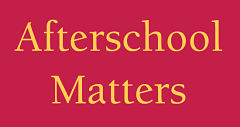The Afterschool Matters Initiative is managed by the National Institute on Out-of-School Time, a program of the Wellesley Centers for Women at Wellesley College
Georgia Hall, PhD, is Managing Editor of the Afterschool Matters Journal
Wellesley Centers for Women
Wellesley College
106 Central Street
Wellesley, MA 02481-8203 USA
asm@niost[dot]org
781.283.2547

